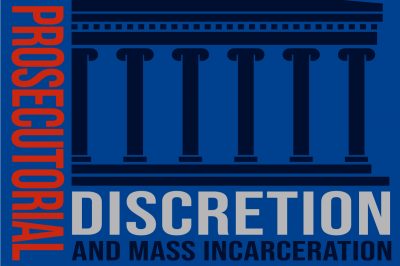
CPILJ 2022 Symposium: Prosecutorial Discretion and Mass Incarceration
Two panels of scholars and legal practitioners explored the use of prosecutorial discretion in Connecticut and the ways that it can influence mass incarceration.
This article was written by Taylorann Vibert, Student Writer for the UConn School of Law Communications Department. The full article can be found here.
The discretion that prosecutors exercise can be a powerful tool for reducing incarceration and the racial disparities that go with it, scholars and legal practitioners agreed at a symposium organized by the Connecticut Public Interest Law Journal.
The symposium, entitled Prosecutorial Discretion and Mass Incarceration, was held online on Feb. 11, 2022. In opening remarks, UConn Law Dean Eboni S. Nelson addressed the stark racial disparities plaguing the criminal justice system and how those inequities can be influenced by, among other factors, the exercise of broad discretion.
“During last year’s symposium, the Connecticut Public Interest Law Journal explored the important issue of discretion and implicit bias in jury selection,” Nelson said. “And I am so thrilled and excited that they have decided to continue their exploration into another important aspect of the criminal justice system involving discretion, namely prosecutorial discretion and the role that such discretion may play in reducing or contributing to mass incarceration.”
The first panel, moderated by Professor Anna VanCleave, director of the Criminal Defense Clinic at UConn Law, focused on the use of prosecutorial discretion in criminal cases in Connecticut and how decisions made from the earliest stages of a case affect outcomes and incarceration. The panelists, offering a variety of perspectives, were Professor Michael P. Lawlor of the University of New Haven, who served as undersecretary for criminal justice policy and planning in the Connecticut Office of Policy and Management; Paul Narducci, state’s attorney for the Judicial District of New London; and Christine Rapillo, the state’s chief public defender.
The second panel focused on shifts in crime, especially among youth, and how prosecutors are using their discretion and other means to divert individuals away from incarceration. The panelists, who offered data and insights on the matter, were Ken Barone, project manager of the Connecticut Racial Profiling Prohibition Project and Andrew Clark, director of the Institute for Municipal and Regional Policy.
The symposium ended with VanCleave leading a question-and-answer session and moderated discussion about the information that Barone and Clark presented. The panelists included Rapillo; Christina Quaranta, executive director of the Connecticut Justice Alliance; and Michael Gailor, state’s attorney for the Judicial District of Middlesex.
“The symposium marked the start of what we hope will be a continued conversation on the role of prosecutorial discretion and its contribution to mass incarceration,” said Luke Reynolds and William Weishaupt, the symposium editors, in a joint statement.” Our panelists illuminated areas of agreement; that prosecutorial discretion needs to exist in order to effectuate justice. However, they also stressed that to reduce incarceration and best advance justice, there needs to be greater transparency, accessible data, renewed policies for pretrial populations, and more resources flowing into youth communities and diversionary programs.”